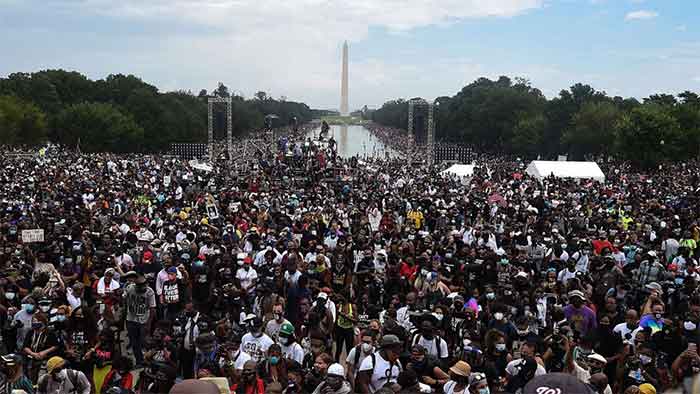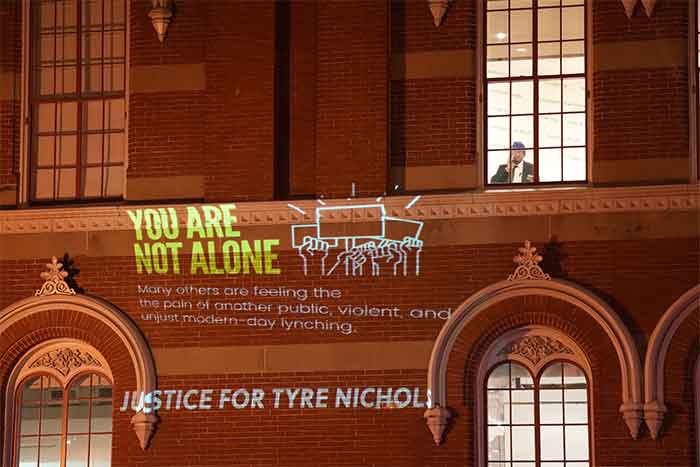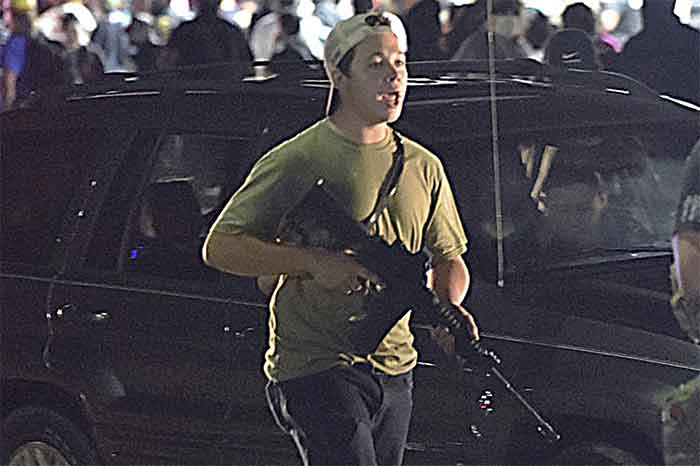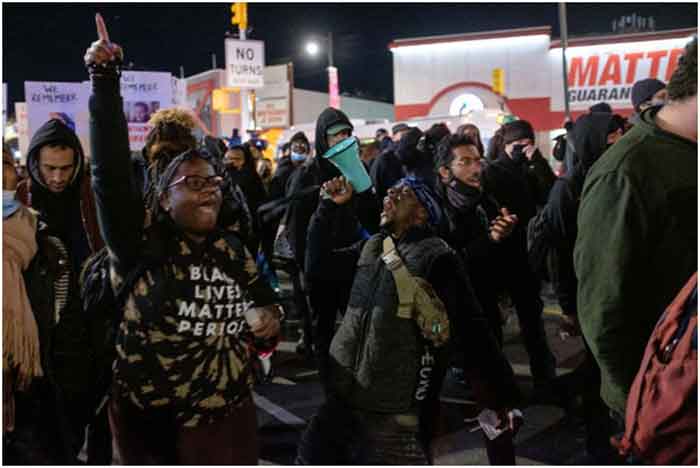
Thousands of protestors seeking criminal justice reform gathered at the National Mall in Washington D.C., the capital city of the U.S., on Friday under the rallying cry “Get Your Knee Off Our Necks,” a reference to the manner in which George Floyd was killed while in police custody in May and reminiscent of the 1963 March on Washington.
Capping a week of protests and outrage over the police shooting of a Black man in Wisconsin, the into Washington D.C. at a commemoration of the 1963 March on Washington for Jobs and Freedom.
Civil rights advocates highlighted the scourge of police and vigilante violence against Black Americans.
The people gathered near the steps of the Lincoln Memorial, where the Rev. Martin Luther King, Jr. delivered his historic “I Have A Dream” address, a vision of racial equality that remains elusive for millions of Americans.
The August 28 marchers gathered on the heels of yet another shooting by a white police officer of a Black man — this time, 29-year-old Jacob Blake in Kenosha, Wisconsin, last Sunday — sparking days of protests and violence that left two dead.
“I want to give space for Black people in the crowd to say they are not okay,” said Jumaane Williams, New York City’s public advocate, who addressed the march attendees shortly after the program began.
“We are like the nameless grandmothers who got in the streets and said ‘We will make you live up to what America says she is,’” Williams said. “We are here. We’re not going anywhere.”
The march shaped up to be the largest political gathering in Washington since the coronavirus pandemic began. Many attendees showed up wearing T-shirts bearing the image and words of the late Rep. John Lewis who, until his death last month, was the last living speaker at the original March on Washington for Jobs and Freedom, which went on to become one of the most famous political rallies in U.S. history, and one of the largest gatherings at the U.S. capital with over 200,000 people advocating for social change.
The thousands of participants that streamed in for the march late Friday morning stood in lines that stretched for several blocks, as organizers insisted on taking temperatures as part of coronavirus protocols. Organizers reminded attendees to practice social distancing and wear masks throughout the program.
Later in the day, Martin Luther King III, a son of the late civil rights icon and the Rev. Al Sharpton, whose civil rights organization, the National Action Network, planned Friday’s event, delivered keynote addresses that show the urgency for federal policing reforms, decry racial violence, and demand voting rights protections ahead of the November general election.
To underscore the urgency, Sharpton assembled the families of an ever-expanding roll call of victims: Blake, George Floyd, Breonna Taylor, Rayshard Brooks, Ahmaud Arbery, Trayvon Martin, and Eric Garner, among others.
Arbery and Martin both were killed by white men who pursued them with guns.
Following the commemorative rally, participants marched to the Martin Luther King, Jr. memorial in West Potomac Park, next to the National Mall, and then dispersed.
Turnout in Washington was lighter than initially intended due to city-imposed coronavirus pandemic restrictions that limit out-of-state visitors to the nation’s capital. To that end, the National Action Network organized a handful of satellite march events in South Carolina, Florida and Nevada, among others.
While participants marched in Washington, Sharpton called for those in other states to march on their U.S. senators’ offices and demand their support of federal policing reforms. Sharpton said protesters should also demand reinvigorated U.S. voter protections, in Lewis’ memory.
In June, the Democrat-controlled House of Representatives passed the George Floyd Justice In Policing Act, which would ban police use of stranglehold maneuvers and end qualified immunity for officers, among other reforms.
George Floyd, a Black man, died May 25 after a white police officer in Minneapolis held a knee to the man’s neck for nearly eight minutes, sparking weeks of sustained protests and unrest from coast to coast.
Voter suppression
In July, following Lewis’ death, Democratic senators reintroduced legislation that would restore a provision of the historic Voting Rights Act of 1965 gutted by the U.S. Supreme Court in 2013. The law previously required states with a history of voter suppression to seek federal clearance before changing voting regulations.
Both measures are awaiting action in the Republican-controlled Senate.
“We’re demanding that that be enacted,” King told the AP on Thursday. “The senators won’t even take action on it. That gives us an opportunity to say, ‘OK, we gave you guys a chance, we as the people, as Black people, as white people, as Latinos and Hispanics and we’re going to vote you out.’”
Later in the evening, the Movement for Black Lives, a coalition of more than 150 Black-led organizations that make up the broader Black Lives Matter movement, held its virtual Black National Convention.
The convention coincided with the unveiling of a new Black political agenda intended to build on the success of this summer’s protests.
The platform will deepen calls for defunding police departments in favor of investments to healthcare, education, housing and other social services in Black communities, organizers said.
Tired of violence
“We are tired of the mistreatment and the violence that we, as Black Americans, have been subjected to for hundreds of years,” Rev. Al Sharpton said in a statement before the event. “Like those who marched before us, we are standing up and telling the police, telling lawmakers, telling the people and systems that have kept us down for years, ‘Get your knee off our necks.'”
Sharpton announced the march in June during his eulogy at Floyd’s Minneapolis memorial service. It occurs on the 57th anniversary of the original March on Washington and in conjunction with the NAACP’s virtual March on Washington.
Civil rights and social justice activists addressed the crowd and delivered speeches from the steps of the Lincoln Memorial, demanding action to end major issues such as systemic racism. Speakers also called for the U.S. Senate to pass H.R.7120, known as the George Floyd Justice in Policing Act. The bill, approved by the House but not by the Senate, would address issues regarding policing practices and law enforcement accountability.
“We must answer the call of institutional racism … now, today, this attack on us as people of color who died on the battles of warfare, who have died on the streets for civil rights, it will stop today,” said Rep. Sheila Jackson Lee, D-Texas. “We will heal the nation, but we will not stop until the nation knows Black lives matter and reparations are passed as the most significant civil rights legislation of the 21st century.”
Joyce Beatty, vice chair of the Congressional Black Caucus, echoed a similar sentiment to protesters.
“Go vote! Go vote!” said Beatty. “Tell them to get their knees of our necks.”
Martin Luther King III, who helped lead Friday’s march, told ABC News’ “2020” in an interview that normally there would not be a march for the 57th anniversary of his father’s historic march.
“But because of what is going on,” the oldest son of Martin Luther King Jr. said, “the climate in this nation – more civil rights demonstrations we’ve seen in our nation and really throughout the world that are finally acknowledging that Black Lives Matter – when you realize the reasons why, police brutality and misconduct is still occurring, it is beyond time for immediate action.”
“We all saw some things begin to move a short period of time after, tragically, George Floyd was killed, but we haven’t made the kind of steps that we need to, certainly not at the national level,” he added.
More than eight minutes
The “Get Your Knee Off Our Necks” March comes toward the end of a summer of unrest sparked by more Blacks being killed or severely injured by police. Floyd, 46, died after Minneapolis police officer Derek Chauvin kneeled on his neck for more than eight minutes. Chauven was fired and now faces murder charges.
Shot at least eight times
Protesters have called for the arrest and prosecution of the Louisville, Kentucky, officers involved in the March shooting of Breonna Taylor, a 26-year-old EMT who was shot at least eight times when plainclothes officers fired “blindly” into her apartment as they executed a no-knock warrant, alleges a lawsuit by Taylor’s mother, Tamika Palmer.
Shot seven times
Most recently, Jacob Blake, 29, was shot by a police officer in Kenosha, Wisconsin Sunday night. According to Blake’s family, he was shot seven times in the back and is now paralyzed from the waist down.
The Department of Justice identified the officer as Rusten Sheskey Wednesday.
SIGN UP FOR COUNTERCURRENTS DAILY NEWSLETTER















































